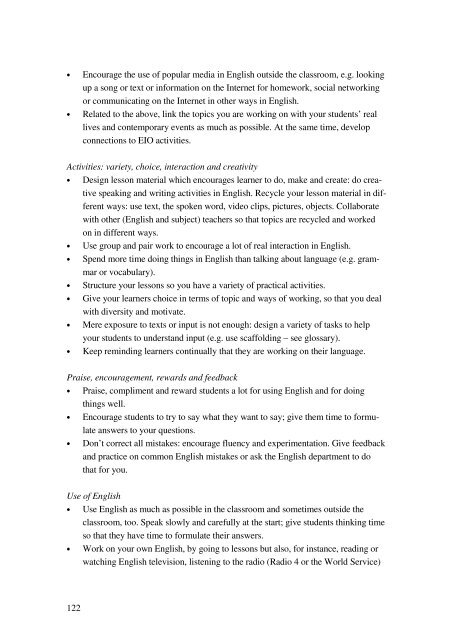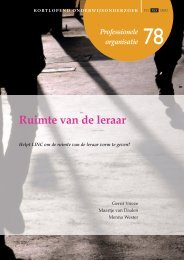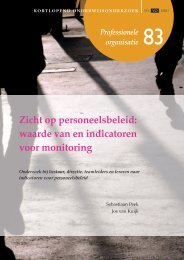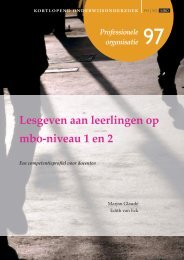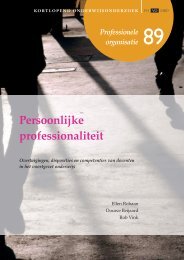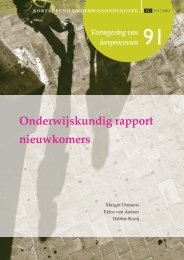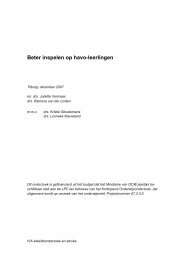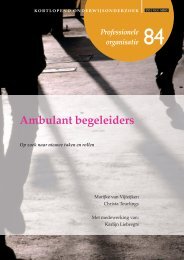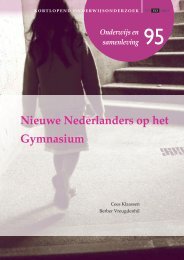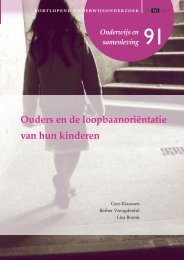Proud to be tvmbo - Kortlopend Onderwijsonderzoek
Proud to be tvmbo - Kortlopend Onderwijsonderzoek
Proud to be tvmbo - Kortlopend Onderwijsonderzoek
Create successful ePaper yourself
Turn your PDF publications into a flip-book with our unique Google optimized e-Paper software.
• Encourage the use of popular media in English outside the classroom, e.g. looking<br />
up a song or text or information on the Internet for homework, social networking<br />
or communicating on the Internet in other ways in English.<br />
• Related <strong>to</strong> the above, link the <strong>to</strong>pics you are working on with your students’ real<br />
lives and contemporary events as much as possible. At the same time, develop<br />
connections <strong>to</strong> EIO activities.<br />
Activities: variety, choice, interaction and creativity<br />
• Design lesson material which encourages learner <strong>to</strong> do, make and create: do creative<br />
speaking and writing activities in English. Recycle your lesson material in different<br />
ways: use text, the spoken word, video clips, pictures, objects. Collaborate<br />
with other (English and subject) teachers so that <strong>to</strong>pics are recycled and worked<br />
on in different ways.<br />
• Use group and pair work <strong>to</strong> encourage a lot of real interaction in English.<br />
• Spend more time doing things in English than talking about language (e.g. grammar<br />
or vocabulary).<br />
• Structure your lessons so you have a variety of practical activities.<br />
• Give your learners choice in terms of <strong>to</strong>pic and ways of working, so that you deal<br />
with diversity and motivate.<br />
• Mere exposure <strong>to</strong> texts or input is not enough: design a variety of tasks <strong>to</strong> help<br />
your students <strong>to</strong> understand input (e.g. use scaffolding – see glossary).<br />
• Keep reminding learners continually that they are working on their language.<br />
Praise, encouragement, rewards and feedback<br />
• Praise, compliment and reward students a lot for using English and for doing<br />
things well.<br />
• Encourage students <strong>to</strong> try <strong>to</strong> say what they want <strong>to</strong> say; give them time <strong>to</strong> formulate<br />
answers <strong>to</strong> your questions.<br />
• Don’t correct all mistakes: encourage fluency and experimentation. Give feedback<br />
and practice on common English mistakes or ask the English department <strong>to</strong> do<br />
that for you.<br />
Use of English<br />
• Use English as much as possible in the classroom and sometimes outside the<br />
classroom, <strong>to</strong>o. Speak slowly and carefully at the start; give students thinking time<br />
so that they have time <strong>to</strong> formulate their answers.<br />
• Work on your own English, by going <strong>to</strong> lessons but also, for instance, reading or<br />
watching English television, listening <strong>to</strong> the radio (Radio 4 or the World Service)<br />
122


